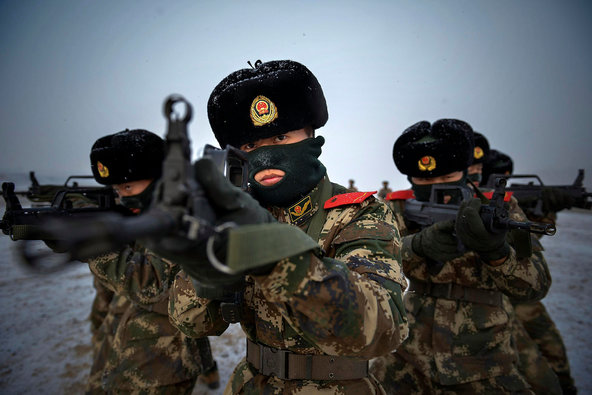Human Rights Watch has criticized China’s new counter-terrorism law for its potential to legitimize rights abuses, warning that vaguely outlined definitions and failure to disclose conviction details could lead to the prosecution of nonviolent activities. The law took effect in January 2016 following repeated calls for counter-terror legislation that began as part of the government’s nationwide “war on terror,” which was launched in response to increased violence in Xinjiang and elsewhere in China. The law has long attracted criticism from a range of actors for its human rights implications.
“The Chinese government claims it’s combating terrorism threats, particularly in Xinjiang, but gives scarce details about these incidents while strictly controlling access of journalists and other independent monitors,” said Sophie Richardson, China director. “By refusing to provide information on terrorism cases, Beijing can easily suppress rights to peaceful criticism and religious identity.”
The 2016 SPC’s annual report to the National People’s Congress stated that in 2015, Chinese courts convicted 1,419 people for threatening state security, inciting “splittism,” and taking part in terrorism – nearly double the numbers of the previous year’s report. But the court’s 2015 and 2016 reports did not disclose a breakdown of these numbers, so it is unclear how many people were convicted for terrorism and precisely for which offense.
Human Rights Watch examined available data from China Court Net, a general news site run by the SPC, and the Peking University Law Database for information on terrorism-related cases in 2016. Only four court verdicts related to terrorism prosecutions from 2016 are publicly available. These two sources may only contain a small percentage of terrorism-related verdicts in 2016. The SPC decision that required court verdicts be posted online provides exemptions for cases that involve state secrets or personal privacy, and cases that are otherwise “not suitable for making public,” which gives the courts wide latitude to withhold information.
The four cases involved seven people – all but one ethnic Uyghurs from Xinjiang. Five received prison sentences from eight months to three years, while one was given a suspended sentence and one was exempted from criminal penalties. [Source]
Officials have repeatedly attempted to link China’s domestic violence to the global jihad movement, often placing blame on foreign forces such as the East Turkestan Islamic Movement. Politically motivated terrorism prosecutions are of particular concern in Xinjiang, home to a predominately Muslim Uyghur majority, because the expansive definition of terrorism and the general lack of transparency makes a large range of ethnic and religious activities punishable under the counter-terror law. In particular, the new law empowers police to impose restrictions on individuals suspected of being involved in terrorism with little or no evidence. Authorities have already began arming police as early as 2014 in response to violent incidents in the country.
At The Jamestown Foundation’s China Brief,
Stage 1 (2009–2011): Responding to the 2009 Urumqi Riots
Despite claims that Wang Lequan ruled Xinjiang with an “iron-fist” during his fifteen-year tenure as Xinjiang Party Secretary (1994-2010), advertised police recruitment was relatively small prior to the 2009 violence. Yet the 7.5 Incident was a wake-up call, with top Party officials deeply embarrassed by the scale of the violence in Urumqi and their inability to quickly quell the unrest. The situation only stabilized after Beijing rushed 14,000 People’s Armed Police (PAP, 武警) forces as well as the relatively recently formed Special Police Units (SPUs, 特警) from 31 provinces to Xinjiang (China Digital Times, July 10, 2009; Sina xinwen, August 17, 2009). In response, the XUAR government initiated its first-ever recruitment of SPU officers by advertising 2,655 positions in December 2009.
[…] Stage 2 (2012–13): Expanded Policing and Surveillance in the Rural South
In January 2012, the new secretary of the XUAR Political and Legislative Affairs Committee Xiong Xuanguo announced the recruitment of 8,000 new police officers in order to beef-up security ahead of the 18th CPC National Congress in autumn of that year (Tianshangwang news, February 1, 2012). This intake advertised 11,559 security-related positions, a 57 percent increase in adverts over 2009 and the highest figure yet for Xinjiang. The principal focus was Southern Xinjiang, due to XUAR officials’ conviction that the violence perpetrated in Urumqi come from Uyghur migrants from the south. [2]
[…] Stage 3 (2014–2015): Grid-Style Community Policing and Big Data Surveillance
Following a series of high-profile terror attacks, including a suicide car bombing in Beijing (October 2013), train station stabbing in Kunming (March 2014) and market bombing in Urumqi (April 2014), Party officials announced a nation-wide counter-terrorism campaign, with Zhang Chunxian declaring a “people’s war on terror” in Xinjiang and Chinese president Xi Jinping calling for “walls made of copper and steel” and “nets spread from the earth to the sky” to capture these “terrorists” ((People’s Daily, May 26, 2014; Xinhua, May 29, 2014).
[…] Stage 4 (2016-): “Convenience Police Stations” and the Massive Expansion of Surveillance Manpower
However, the largest boost in policing capabilities took place in 2016. A total of 31,687 security-related positions were advertised, more than a three-fold increase over the previous year. This unprecedented recruitment drive sought to boost the Party-state’s surveillance capabilities across all regions of Xinjiang, as only 35 percent of advertised positions were designated for regions with a Uyghur population of 40 percent or higher. [Source]








